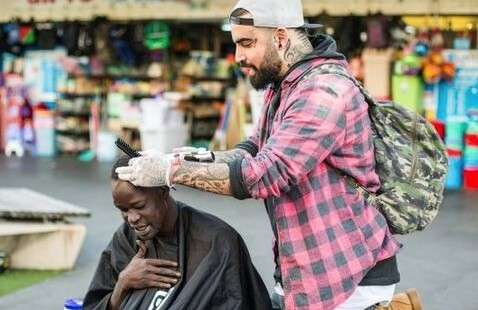4 Heroes Given Carnegie Medal for Extraordinary Bravery Saving Lives
The Carnegie Hero Fund Commission honored them and 14 others with medals commending their bravery and quick thinking.

Six days a week, Nasir Sobhani cuts hair in a barber shop. On the seventh day, he hops on his long skateboard, packs up his barber kit, and approaches homeless people in some of Melbourne, Australia's roughest neighborhoods to ask them if they'd like a free haircut.
When he finds a taker, he's able to offer just a few moments of normalcy to someone who hasn't had something as simple as a haircut in a very long time.
"They need actual human contact, some stimulus to help engage them in a form of intimacy with a human being that cares for them," said Sobhani, a 26-year-old Canadian native now widely known as the "Streets Barber" thanks to a popular YouTube documentary.
At 3 a.m. Australia time, he sat down for a Skype session with Good News Network and showed us around his studio.
The fact that he was once a cocaine and opiate addict, he explains, helps him relate with many of his street "clients" who struggle with addiction and alcoholism, and opens the door for meaningful conversations.
"What I'm doing is my way of giving back. I remember when I used to hate myself and not look in the mirror without crying because I would be so disgusted with who I was," he said. "I find embedded within a lot of my street clients that they feel so ashamed of how they are."
Sobhani made it to rehab and, after he got out, his family sat him down and said, "You should do what you love doing: cutting hair."
It was a passion he found early on while hiding from his combative older brother in their family's bathroom.
"I locked my seven-year-old self in there for two hours. I was bored, so I laid some towels down, grabbed my dad's shaver, and got rid of my peach fuzz mustache," he explained.
While his customers may not be able to afford tips, they thank him in other ways.
As he searches his shelves for trinkets, Sobhani finds a bracelet, some drawings, and glass heart, given to him by a woman who's hair he cut recently.
"I want you to have my heart," is what she told him. But to him, the most rewarding part of all is making a connecting with someone, and, sometimes, planting a seed. He may ask them why they drink, why they use, what it would take for them to stop—but that's all he can do, since he usually never sees them again.
When his clients do stick around, that's when his other favorite form of gratitude comes into play.
"To me, the biggest thank you is when someone comes up to me and says, ‘Nas, I'm not letting anyone else cut my hair!' The client loyalty, like I'm their barber, means the most," he said.
Above all, he says, his faith is what drives his mission to help others like himself find reason to look in the mirror again.
"In the Bahai faith, serving the community and helping others is really the way we worship what we believe " he says. "It's through acts of service, not sitting in a church or mosque or synagogue or praying to the wall. The faith encourages action."
Even though nine out of ten people turn him down when he first approaches them, he'll keep trying, one seventh day at a time.
(WATCH the video below to see more) Photos via Nasir's Instagram, Copyright Scott Bradshaw —Story Tip from Nicole Hoss
Share This Inspiring Story With Your Friends:
Be the first to comment